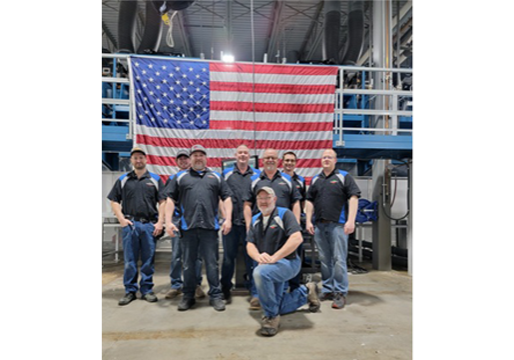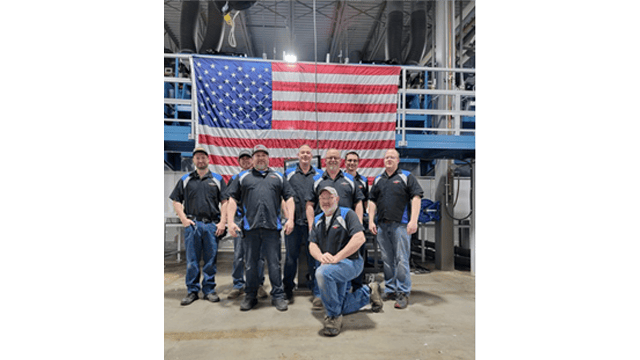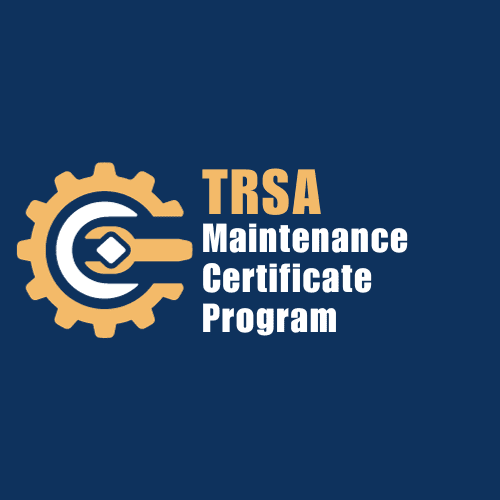Textile Care Services’ 40 years of collaboration with Rochester (MN) Community and Technical College testifies to the power of maintaining a relationship with this type of institution to staff a laundry maintenance and engineering operation. Chief Engineer Forrest Rouhoff, an RCTC alumnus, faces periodic vacancies on his TCS team. As they arise, he immediately knows where to turn first to fill them. He maintains his personal connections with the school thanks in large part to joining other businesses in the Rochester area to provide internships to RCTC students.
In a March 2025 interview with TRSA.org, Rouhoff explained the components of the collaboration that have turned RCTC into the premier source of recruits for TCS—tactics you might emulate in developing such a program for your linen, uniform and facility services operation.
What skills do RCTC interns bring to TCS?
Originally titled the RCTC Building Utilities Mechanics program, it’s been renamed Facilities and Service Technician. It’s a 4-semester program: 1) boilers, 2) electrical, 3) refrigeration and 4) HVAC. Internships take place in the third and fourth semesters, so the students arrive with a good electrical background. They know how to weld and they know a little bit of IT networks, plumbing and pneumatics. It’s a lot to teach in four semesters. TCS doesn’t have strict qualifications, just that students are currently enrolled.
How did the TCS/RCTC program get started?
At the onset of the 1990s, TCS management was aware of the “BUMs” program. A couple of TCS maintenance staff had been through it. This inspired the laundry’s management team to recruit more from the school and familiarize the faculty with the type of maintenance/engineering work they could provide graduates. They would visit RCTC and inform the school of job openings. Shortly after TCS joined the internship program. To date, one staff member who interned in the 1990s remains with the laundry. Of the current 11 maintenance/engineering staff at TCS, eight are former RCTC students or interns, including Rouhoff.
How does this format benefit TCS?
Instead of getting one individual for the whole semester, TCS could get up to four or five of them in rotation that time. A semester is 12 weeks, so having two or three weeks with each is enough time to get to know them. If TCS really likes them in their first of their two internship semesters, the laundry may encourage them to come back the following semester for a few weeks or even the full semester. If their first go-round with TCS is in the spring semester, the laundry might offer them a summer job. If they’re graduating, it could be a full-time slot. Hiring could be delayed as well. Rouhoff has contacted former interns about open positions months or years later. He estimates the company has had more than 20 interns in the past 10 years.
What functions do RCTC interns perform?
Upon arrival, students apply their skill and knowledge to on-the-job training. They learn from the staff by job shadowing. They’re committed to TCS one day a week (the same day, either Monday or Friday) for at least two weeks during a semester. They will fill all weeks of a semester with work assignments in one or more workplaces besides TCS. RCTC requires them to log a minimum number of internship hours to receive credit for the internship and describe in writing what they’ve done each day. Rouhoff keeps them away from janitorial work because they’re going to school to learn; to experience a classroom extension. Rouhoff is more likely to assign them to senior mechanics, who typically handle more complex tasks. Interns also are involved in “all-hands-on-deck” projects.
How limited is your commitment to interns?
They come in on the same day each week for however many weeks they’re there. Some might not be there that long. At the end of the second semester, they pick their internships, or sometimes at the start of the following semester. The college tries to line it up and plant the seed for what they can do for their internship. They communicate this to the employers as well.
Do you pay interns?
TCS chooses to do so in large part to demonstrate to students the importance of the work. It helps with insurance as well, making them more covered under our insurance. If something happens, it’s less red tape. TCS treats them just like regular employees. At the end of their internship, if offered a full-time position, there’s no more paperwork to do. They fill out the same paperwork as everyone else, go through the same safety training, and then go to work. The college prefers interns not be paid but respects participating employers’ decision to pay them. Rouhoff notes that some students want to be paid to offset debt from schooling.
How consistent is the internship program in building a recruit pipeline?
TCS had arranged for a single intern in spring 2025 but that individual didn’t return to school. Enrollment numbers have been down over the years, dropping from 20-40 students to maybe 15. This makes it tough as an employer because as people retire, there aren’t many taking those jobs. However, enrollment is up now, and there’s a waiting list of 10 students.
What is the role of boiler operator licensing in TCS maintenance hiring?
Minnesota requires a second-class boiler license to be a boiler operator, which requires one year of boiler operation experience after taking a test. One licensee must be on every shift when a boiler operates. RCTC students come out of the program with that license, enabling them to be hired for a TCS mid-level maintenance position. This makes interns more qualified for these positions. Laundries need people who can do it all—electrical, HVAC, plumbing, etc. A resume from someone who went through the program goes to the top of the recruiting list.
What restructuring of the RCTC internship program did TCS suggest and why?
TCS called for a change from allowing students to select one employer for the internship duration to encouraging them to work for multiple employers in that time. Students are now more likely to go to a single location for two to three weeks and then move onto others during the semester. Internships are required; students can select their workplaces. One program instructor indicated that many students prefer this format and many former students said they wish they were able to do that. Without this flexibility, they can get complacent. When they’re done with school and looking for a job, they gravitate toward a job because they’re confident they’ll like it and enjoy it. With the RCTC approach to internships, they realize the other functions they can perform, which can generate a favorable impression of laundry maintenance and engineering work. Rouhoff’s conversation with a former TCS employee who was an RCTC student and now is in healthcare revealed this individual works largely on four types of pumps and their related issues. He told Rouhoff if he ever got sick of it, he’d come back to textile in a heartbeat.
TCS also hires mechanics who haven’t been through the program. What distinguishes them?
Their strong work ethic and mechanical abilities. Rouhoff has hired all three on the current staff not from RCTC. Rouhoff worked with one many years ago in a production job; this recruit had worked on cars. The second one was similar: an airplane mechanic looking for something different. The third’s only experience was in lube; he was changing oil at a dealership. All these risks paid off because TCS found great employees.
Pointers for Initiating Your Program
Any linen, uniform and facility services plant that creates a program like TCS’s can benefit from these practices contributing to the laundry’s maintenance recruiting and retention success with RCTC.
Don’t worry about “cold-calling” a school contact
You have a good chance to find a program like RCTC’s at a local school. Check the school’s website to see if the curriculum fits our industry. Approach the Dean of Students or similar job title; or program instructors who teach classes like RCTC’s. If you reach out to any of them, they’ll all help point in the right direction because these schools are focused on their graduation and placement rates. Everyone’s responsible in some way for turning out well educated students.
Carefully assess interns for their potential to become full-time employees at any point in the future
With no long-term commitment to an individual who works for you part-time as a student, you test the individual’s fit with your organization. You gauge their commitment to the work. At TCS, the program has them at school four days a week and the internship on the fifth. If they’re on spring break, they may feel that not having class means not having to work their internship day. Some individuals, you don’t want them back full-time, they don’t take it seriously. They don’t show up on time, for example. This contrasts with those who say they need a day off to study for a test. Or those who have their hands in their pockets at first because they’re intimidated. These prospective hires shouldn’t be written off. Some are green and trying to learn. They might seem like bad eggs but they’re really go-getters: listeners who follow directions. If they can’t make it on their regular day, you give them the flexibility to do so on another. You learn that they’re skilled and have the right attitude so you may want to offer them jobs.
Demonstrate our industry’s merits against those of other industries
Students looking forward to their options after completing schooling may have their sights set on an industry for their career—maybe they would prefer a service technician position to one in a single or a few locations. If they want to be in service and the internship puts them in just one location, that’s tough. On the other hand, if they come to TCS and they want to learn about plant work, the experience will reinforce that. General maintenance in the laundry industry is multi-craft; technicians do a little bit of everything in a production facility. This contrasts with a service job in which they go out and repair furnaces, for example. Driving from project to project can be a lot of windshield time. Other industries, such as hotels, offer multi-craft and limited-location work, too, and interns will recognize their versatility accordingly.
Rouhoff started with TCS 15 years ago but left the laundry for the food processing industry. He’d been in a co-op program previously in another industry. Working in food processing for a year, he felt the experience there was beneficial for skill development and recognizing the kind of work he liked—laundry engineering.







